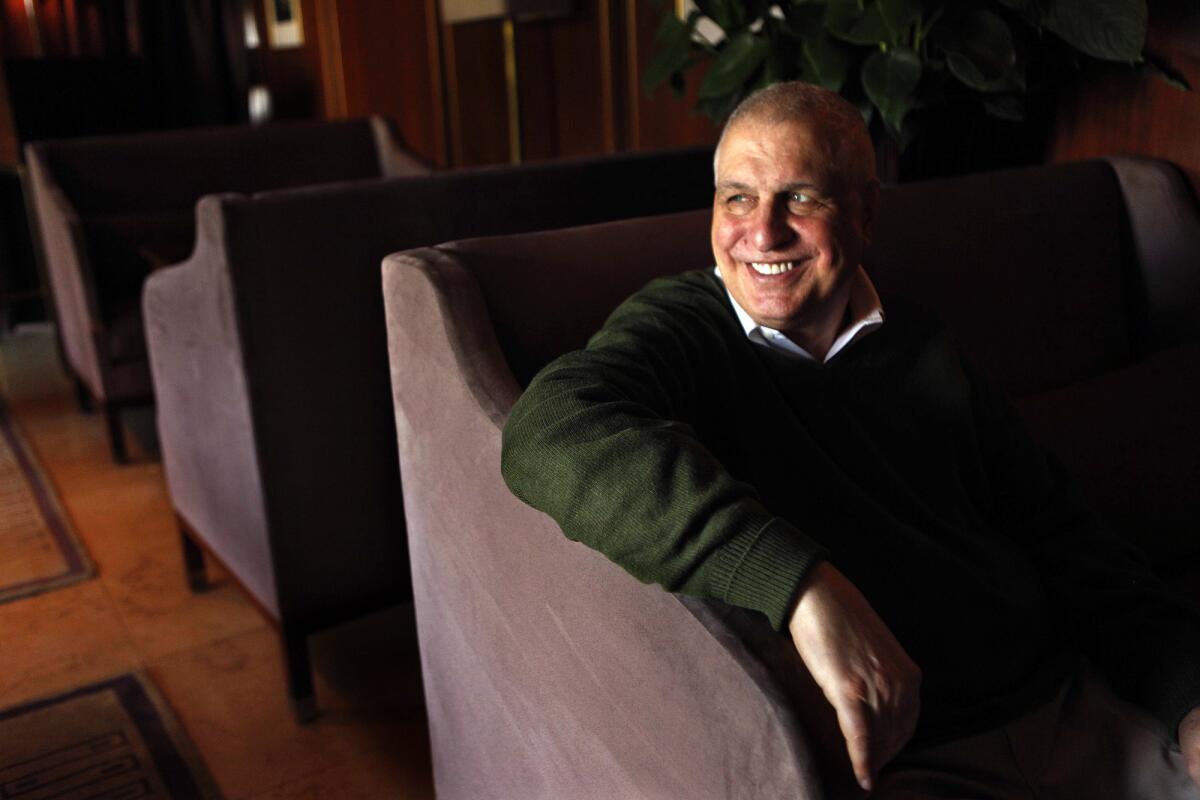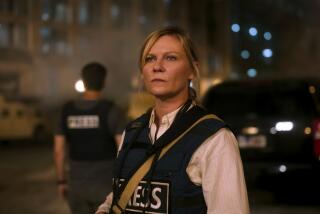Errol Morris talks to Donald Rumsfeld: ‘The Unknown Known’

Filmmaker Errol Morris knows something about black holes and quagmires. His 2003 Oscar-winning documentary, “The Fog of War: Eleven Lessons From the Life of Robert S. McNamara,” examined the Vietnam War through the regrets of a former U.S. Defense secretary, and “Standard Operating Procedure” in 2008 looked at cruel and unusual treatment of Iraqi prisoners at Abu Ghraib prison. Last week, Morris, 66, was in Los Angeles ahead of the April 2 release of “The Unknown Known” and sat on the patio of the Sunset Tower to discuss the curious sea of words, slogans and internal Pentagon memos (a.k.a. “snowflakes”) of his new wartime subject, former Defense Secretary Donald Rumsfeld.
You’ve been drawn deep into wartime subject matter in recent years.
Probably stupidly. Here’s my excuse: It interests me. What were they thinking — if they were thinking?
“The Unknown Known” and “Standard Operating Procedure” are so different from pet cemeteries and other subjects that started your documentary career.
BEST MOVIES OF 2013: Turan | Sharkey | Olsen
From pet cemeteries to human cemeteries. I just did an interview with NPR, and the interviewer kept asking me about my level of frustration with Rumsfeld: “Was he giving you what you wanted?” I was frustrated with McNamara as well as Rumsfeld. I continued interviewing McNamara after I finished “The Fog of War.” One of the things that’s fascinated me for years is the second attack in the Gulf of Tonkin. Why? Because we ended up going to war [in Vietnam], and we now believe that second attack never occurred. We went to war for something that never happened. That’s not a nice thought.
Didn’t we go to war in Iraq for weapons of mass destruction that didn’t exist?
I have this nasty version of Santayana: “Those unfamiliar with history are condemned to repeat it without the sense of ironic futility.” So what are you supposed to ask Rumsfeld? Excuse me, sir, did you really think there were WMD in Iraq? The real answer is unappetizing. The answer is he didn’t care. To care you have to be concerned with the nature of evidence.
PHOTOS: Box office top 10 of 2013
Rumsfeld and McNamara seem to be very different kinds of people.
They couldn’t be more different. But they presided over disastrous wars. That’s not OK. You can be reflective, you can be remorseful, you can be really engaged by the tales of what you have done and haven’t done. And McNamara realized this. There’s no magic slate for any of us; we can’t just pull up the acetate and it all goes away.
McNamara at least had some regrets that he was willing to share.
Rumsfeld is also willing to share the fact that he has no regrets, isn’t sorry, sees nothing wrong with what he’s done. In fact, he’s proud of it.
Strangely, one thing he didn’t want to discuss were the words “shock and awe.”
There are moments throughout the film like that that are just crazy. They are moments that really satisfy me, crazy filmmaker that I am. When I ask him about the torture memos and he says he never read them, I actually am appalled. I say, “Really?” This is one of the black stains in American history: “Never read them.”
PHOTOS: Behind the scenes of movies and TV
He seemed to enjoy talking. Doesn’t he know what you do?
I asked him a question at the end of the film that everyone asks me: “Why are you talking to me?” The answer is, “That’s a vicious question.” It’s a vicious question because I’m asking him to think about something. How dare you! Then he gives me an extraordinarily truthful answer that could stand in for every single question asked of him: “I’ll be darned if I know.”
It’s notable because so many politicians will now only sit for interviews in friendly territory like Fox News or MSNBC.
Am I unfriendly territory? Probably. Having said that, I was willing to listen. The whole thing continues to bother me. The center of it is that press conference where he first mentions the “known known” and the “known unknown” and the “unknown unknown.” It’s in response to a question from the NBC Pentagon correspondent, who says to him: What evidence do you have that Saddam Hussein has weapons of mass destruction or is providing terrorist organizations weapons of mass destruction? He uses the E word.
PHOTOS: Celebrities by The Times
It’s a good word.
This is at the heart of this whole stupid war. Ultimately I don’t think he cares about evidence. It’s like some old-fashioned idea. I imagined that this was a return to something from before the scientific revolution: Dogma versus science versus empiricism. It’s really terrific that these people are running the world.
What do Rumsfeld’s use of mysterious phrases about “known knowns” and “known unknowns” say about the man?
I looked up the origins of those expressions, and “the unknown unknown” appears first in romantic poetry — in John Keats. [John Wesley] Powell, who was the first person to run the Colorado River in the Grand Canyon, was the first in one sentence to talk about the “unknown known” and the “known unknown.” A lot of this stuff has been repurposed. He lives in a strange kind of phantasmagoria of his own devising. I’ve made many movies now about the self-deceiving, the delusional, the clueless. Nothing will ever come close to this.
CRITICS’ PICKS: What to watch, where to go, what to eat
You hit the jackpot.
People say, “Oh, he’s such a tricky, slippery customer. He’s really hiding something.” You know what he’s hiding? He’s hiding the fact that he’s hiding nothing.
Do your subjects tend to like your films?
McNamara told his son, “I really like the film, but don’t tell Errol.”
How about Rumsfeld?
I’d heard that he really liked it, but then he started reading about these various interviews that I gave, which did not make him happy. I feel a little guilty. Was Rumsfeld charming? Yes. Did he give me a lot of his time? Yes. He was incredibly gracious. Have I been incredibly gracious? Perhaps not, but I found that all of this made me angry. It was like sitting across from a black hole. After all, this is my country.
More to Read
Only good movies
Get the Indie Focus newsletter, Mark Olsen's weekly guide to the world of cinema.
You may occasionally receive promotional content from the Los Angeles Times.







